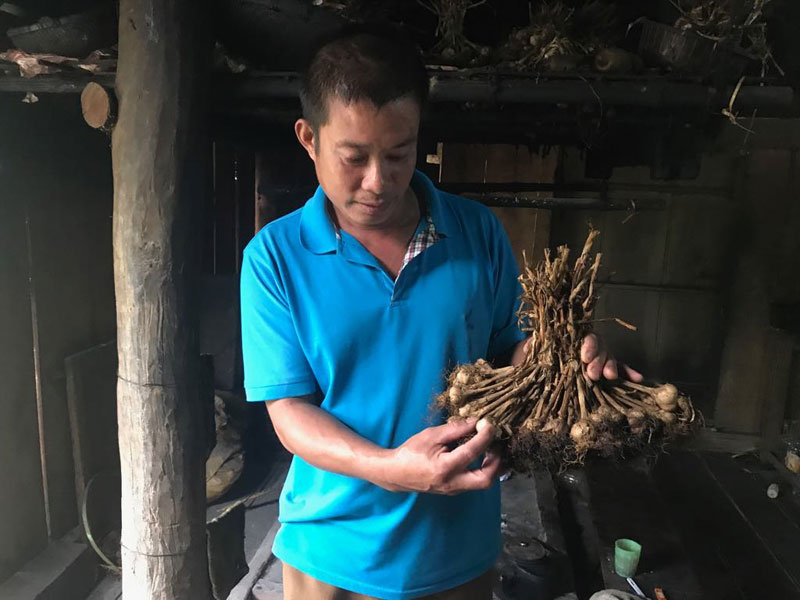
(HBO) – Each year, once the busy harvest season ends, farmers in Pu Bin commune of Mai Chau district, Hoa Binh province, start preparations to plant purple garlic. Making use of the cool mountainous climate, local residents have expanded the garlic planting area to raise their income.
Ha Cong Tin, a resident in
Na Phat hamlet of Pu Bin commune (Mai Chau district), stores dried garlic to
wait for prices to become more stable before selling the produce.
Purple garlic has a special taste and is also a
valuable herb curing many illnesses. Additionally, it suits local climate, so
residents in Pu Bin commune are farming this cash crop on a larger area.
The cultivation area reached 17ha in late 2017,
and it is expected to rise to 20ha this year and to continue to expanding in
the coming years. Na Phat and Bin communes have the largest garlic farming
area, over 10ha in total.
Ha Cong Tin, who has the largest garlic
cultivation area in Na Phat hamlet, said each year, after the harvest season,
his family will start to prepare soil for planting garlic. Last year, they
farmed 1,500 sq.m. of garlic and expanded the area to 2,000 sq.m. this year.
Garlic is easy to be cultivated and not vulnerable to diseases. Farming
techniques are simple as the plant needs little water and suits the local
climate, so it always grows well. He harvested nearly 400kg of garlic in last
year’s crop.
All households in Pu Bin commune have cultivated
garlic so far, from 40 sq.m. to 2,000 sq.m. each. Among them, Ha Cong Tin in Na
Phat hamlet plant 2,000 sq.m. of garlic while Dinh Cong Thang, a resident in
Bin hamlet, farms 1,800 sq.m.
Purple garlic of Mai Chau is favoured by
consumers thanks to its special good taste compared to other types of garlic in
the market. However, the sale of the local specialty remains unstable.
Kha Van Huong, head of Na Phat hamlet, said they
always meet difficulties in selling garlic. Because local residents live in a
mountainous region far away from urban areas, they have to bring garlic to
markets even before the dawn breaks and go back after the twilight, yet they
can sell only several kilogrammes of garlic.
If people fail to sell all garlic they bring
along, they can hang the produce above stoves to preserve and wait for higher
prices. However, garlic can only be stored for a short period of time as it may
sprout or become mouldy. If traders come to buy garlic at gardens, prices may
reach up to 50,000 VND (2.14 USD) per kg or drop to 15,000 – 20,000 VND (0.64 –
0.86 USD) per kg, Huong noted.
In Lac Thuy district, communes have been succeeded in promoting their One Commune-One Product (OCOP) products while others are still struggling to position their typical farming products in market. Some communes in the district still fail to have their products met OCOP programme’s requirements, while others have seen their certifications expired.
The inspectorate agency of Hoa Binh province has issued Official Dispatch No. 1090/TTr-PCTN to provincial departments, agencies, localities, business associations, enterprises, and investors regarding measures to improve informal component indexes of the Provincial Competitiveness Index (PCI).
Hoa Binh is taking concrete steps to improve its investment environment, with a strong focus on supporting businesses, settling obstacles for strategic investors, and creating opportunities for robust development in the coming years.
Under the blazing early summer sun, the construction site of Nhuan Trach Industrial Park (IP) in Luong Son district is abuzz with activities from dawn to dusk, a testament to the determination of the investor to meet their construction targets on schedule.



